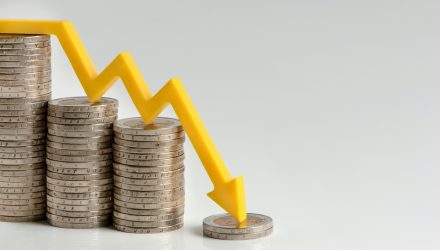On Tuesday, Goldman Sachs published a report. It pared the odds of the U.S. economy slipping into a recession over the next year to just 15%.
Broadly speaking, that’s good news, particularly for economically sensitive sectors such as consumer discretionary and technology. That’s confirmation that exchange traded funds such as the Invesco QQQ Trust (QQQ) and the Invesco NASDAQ 100 ETF (QQQM) should benefit should the Federal Reserve prove successful in orchestrating a much-ballyhooed soft landing.
“We strongly disagree with the notion that a growing drag from the ‘long and variable lags’ of monetary policy will push the economy toward recession,” Jan Hatzius, Goldman’s chief US economist, wrote in the report. “In fact, we think the drag from monetary policy tightening will continue to diminish before vanishing entirely by early 2024.”
Another Sign of Receding Recession Expectations
In what could prove to be more good news for QQQ and QQQM, the frequency of recession mentions by S&P 500 member firms declined on earnings conference calls during the June 15 through August 31 period.
While QQQ and QQQM follow the Nasdaq-100 Index (NDX), not the S&P 500, the overlap between those benchmarks is substantial. Eighty-two percent of QQQ and QQQM holdings are also members of the S&P 500 and the overlap by weight between the two indexes is 44%, according to the ETF Research Center. That confirms the two Invesco ETFs are positively levered to declining recession forecasts.
“After peaking in Q2 2022, the number of S&P 500 companies citing ‘recession’ on earnings calls has declined for four straight quarters,” noted FactSet’s John Butters. “The number of S&P 500 companies citing ‘recession’ on earnings calls for Q2 2023 is 45% below the number in Q1 2023 (113), 58% below the number in Q4 2022 (147), 66% below the number in Q3 2022 (184), and 74% below the number in Q2 2022 (238). In fact, this quarter will mark the lowest number of S&P 500 companies citing ‘recession’ on earnings calls for a quarter since Q4 2021 (14).”
Another plus for the ETFs is that financial services had the highest percentage of recession mentions on recent earnings conference calls. Conversely, technology and communication services companies didn’t widely mention recession. Those sectors combine for 65% of the QQQ and QQQM portfolios. The number of companies mentioning recession was also below the five-year average during the second-quarter reporting season.
For more news, information, and analysis, visit the ETF Education Channel.








